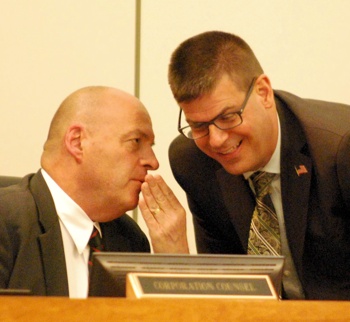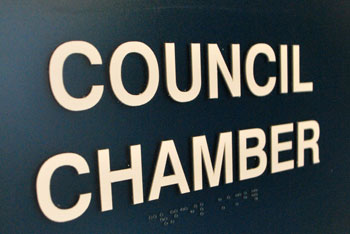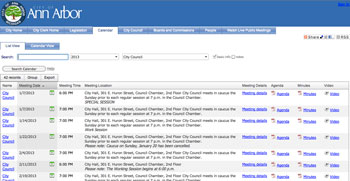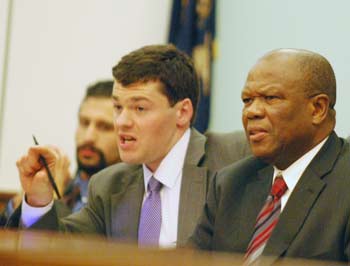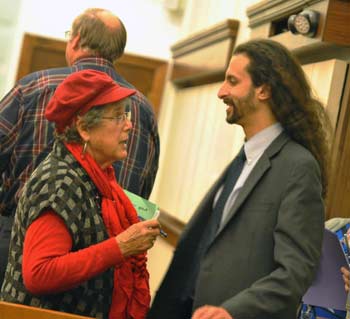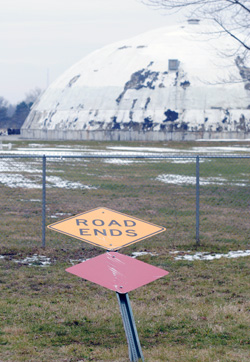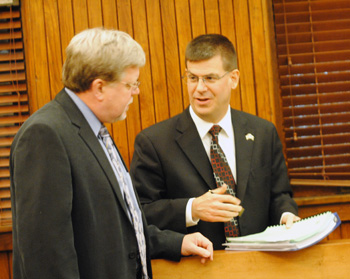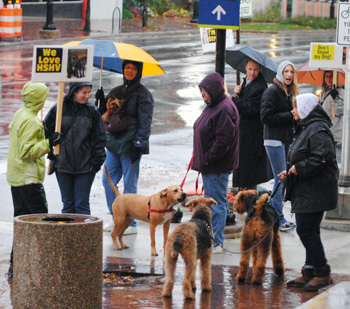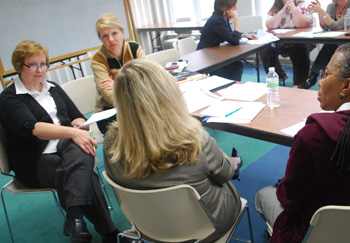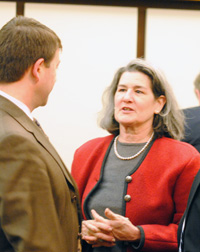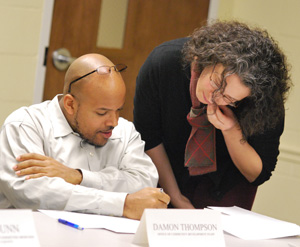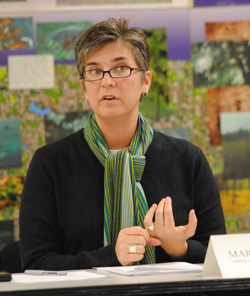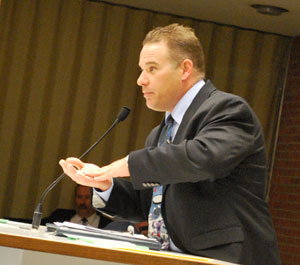County Continues to Explore Road Funding
Washtenaw County board of commissioners meeting (May 21, 2014): The county board rejected a proposal to levy a 0.4-mill countywide road tax in December, but agreed to continue discussing funding options for road repair.
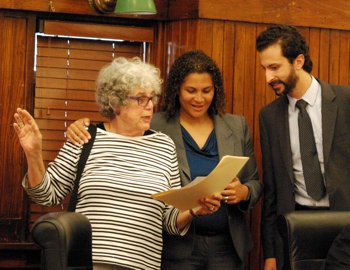
Former county commissioner Barbara Bergman, left, talks with Felicia Brabec (D-District 4) and Yousef Rabhi (D-District 8) before the board’s May 21, 2014 meeting. Bergman spoke during public commentary to oppose a possible road tax. (Photos by the writer.)
The vote on levying a millage was 2-6, with support only from Dan Smith (R-District 2) and Conan Smith (D-District 9). Alicia Ping (R-District 3) was absent. The tax would have been levied under Act 283 of 1909, which does not require voter approval.
Several commissioners spoke against levying this kind of tax at this time. Andy LaBarre (D-District 7) advocated for waiting to see whether the state provides more funding for roads. Ronnie Peterson (D-District 6) reported that the boards of Willow Run and Ypsilanti public schools are considering levying tax increases this summer of 2.8 mills and 1.2 mills, respectively. The state passed legislation that enables school districts to levy millages for debt retirement without voter approval. Noting that a new public transit millage had been approved by voters earlier this month – in Ypsilanti, Ypsilanti Township and Ann Arbor – Peterson said the communities that he represents would be hard-pressed to handle yet another tax increase.
Dan Smith argued that there are few funding options available to the county to pay for road repair, and that the need for additional revenues is critical because the roads are in such bad shape. He said he was well aware of the reasons why this was a bad plan – even a terrible one – but added that the only thing worse would be to do nothing. Conan Smith pointed out that because all of the board seats are up for election this year, residents will have a way to weigh in on this decision, albeit indirectly. “This is the most defensible moment that we have” to levy a tax that doesn’t require voter approval, he said.
The May 21 meeting also included a public hearing on the possible levy. And the board heard from people on the topic during general public commentary. In total, seven people spoke about the road funding issue. Former county commissioner Barbara Bergman, who is an Ann Arbor resident, argued against levying the tax, while former state Rep. Rick Olson of York Township urged commissioners to levy the full 1-mill amount allowed under Act 283. Another resident argued against any tax that isn’t approved by voters, calling it taxation without representation.
After the tax levy resolution was rejected, Yousef Rabhi (D-District 8) brought forward a resolution to create a seven-member road funding committee that would explore options – including Act 283, as well as other possible revenue sources like bonding or a voter-approved tax. The initial vote to form the committee passed on a 6-2 split, over dissent from Conan Smith and Dan Smith. A final vote is expected on June 4. If approved, members would be appointed at a later date, with the direction to provide a road funding plan to the board in the fall.
Commissioners also weighed in to oppose oil exploration and drilling in the county, prompted by a company’s permit application to the state to drill in Scio Township. The vote was 7-1, over dissent from Dan Smith. Two residents spoke during public commentary,urging the board to oppose oil drilling.
During deliberations, Dan Smith argued that the issue was outside of the county’s purview, because the county can’t regulate oil drilling. He noted that the easiest way to prevent oil drilling is for property owners not to sign leases with companies that seek to drill on their land. Other commissioners supported the resolution, citing environmental and public health concerns, including the proposed drilling location’s proximity to the Huron River.
In other action on May 21, commissioners took initial steps to: (1) put a 10-year countywide parks and recreation operations tax renewal on the Nov. 4 ballot, at 0.2353 mills; (2) create a board of health that would give advice on public health issues; and (3) approve an application for a $940,000 federal grant that the county would make on behalf of Ann Arbor SPARK, the local economic development agency. Funds would be used to help redevelop the former General Motors Willow Run Powertrain plant in Ypsilanti Township for use as a connected vehicle testing facility.
Given final approval on May 21 was this year’s allocation to local nonprofits through the coordinated funding process, in which the county participates.
The board also approved a process that will determine how the $3.9 million budget surplus from 2013 will be allocated. Conan Smith said he felt “personally let down” by the approach, because the county administrator has already recommended to keep that amount in the general fund’s unearmarked reserves. He thought it was “turning out to be little more than a rubber stamp of a decision that’s already been proposed by the administration.” Felicia Brabec (D-District 4), who’s leading this process, stressed that commissioners will be discussing and making the final decision – which might differ from the administration’s recommendation. [Full Story]




